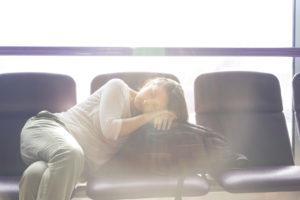
Most of us are active during the day and have a good night’s sleep at night. It happens every day without us even thinking about it. It’s a very natural process. It’s very regular, and when running smoothly, it keeps us healthy. But when interfered with, this natural rhythm is thrown off, and we have problems.
One of these problems is jet lag (also called time zone change disorder) – the problem of adjusting to a new time zone when traveling. It is worse when traveling east because travelers lose time and the day is shorter. But it is a problem going either way. You may find yourself wondering how to overcome jet lag.
Our sleep-wake patterns are called circadian rhythms. Basically, our senses tell us when the sun is out and when we should be up and about – and when it gets dark and we should start thinking about sleep. We are on a 24-hour biological clock.
Our body clocks react to body temperatures rising or falling, certain hormone levels, and other biological clues. The primary source for these changes is exposure to sunlight.
A group of cells in the brain’s hypothalamus controls circadian cycles which ebb and flow throughout the day, keeping us specially alert at some times and less alert at others.
Circadian rhythms are tied into the place we live – our geographic location, where the sun rises and sets at familiar times each day. When we travel to a distant place, the sun is moving at an unfamiliar time, and our rhythms are thrown off. Our bodies need some recalculating.
If traveling west, we gain time because the sun hasn’t caught up with us. So we have extra hours to spend. When our bodies think it’s time for bed, our circadian rhythm is still on east time. But we are on west time, so we have to stay awake longer.
The opposite is true for going east. We lose time. When we think we still have time to do things, it’s already bedtime for locals. Our circadian rhythm is off the other way.
Fortunately, there are some ways to deal with this problem so we can get our bodies back on track to wake and sleep better wherever we are.
How to Overcome Jet Lag: 7 Proven Tips
Select a Sleep-Friendly Flight
If possible, select a flight that arrives early in the afternoon. Stay up until 10:00 PM on the first day. If naps are needed, they should be two hours or less. Some people can sleep on planes, and this could be a good choice for napping.
Direct flights will have less impact on sleep cycles than connecting flights with long layovers. Cast-to-coast trips in the U.S. and international trips can take a full day of travel and raise havoc with circadian rhythms. Getting some rest in advance of the flight can help the body prepare for the stress of prolonged travel.
Simulate the New Time Zone
By knowing the difference in time between zones, a traveler can simulate being in the target zone and actually prepare the body to experience differences in sleep patterns.
One way to do this is to go to bed an hour or two earlier if traveling east – or later when traveling west – a few days before travel. These gradually advancing sleep schedules will help the body anticipate and adjust to the demands of the new time zone.
Some research has shown that carefully controlled light therapy can be used to simulate new sleep schedules. Studies suggest 3.5 hours of intermittent indoor dim light in the mornings is an effective therapy to advance circadian rhythms before heading east.
Sleep Hygiene
When arriving at the destination, avoid stimulants like caffeine and alcohol before bedtime. Foods heavy in sugar, starch or other carbohydrate-based foods should be minimized before bedtime. There might even be an urge to overeat when traveling. Research has shown that there is a relationship between social jetlag and obesity.
Some travelers like to work out when on the road. But in the case of jetlag, heavy exercise close to bedtime can interfere with a good night’s sleep. Lighter exercise earlier in the day is more often recommended.
Minimize Stress
Stress is a normal part of airline travel and moving to a different time zone. You may create stress in worrying about how to overcome jet lag. It is also stressful to have to sleep in an unfamiliar environment. There are some things you can do to make the experience a little more palatable.
One thing you can do is bring something from home – something familiar – with you. This can be a photo of a loved one, a spouse or family member, or a pet. It can be a favorite pillow or blanket, or even that coffee or tea mug you’ve been using every day. Any familiar item can make the traveling environment seem less strange.
If you are staying at a hotel, there is always the chance for surprises. You can talk to hotel services and ask to have your voice mail taken care of, and you can ask for wake-up calls. You can even ask for a second wake-up call for added reassurance.
Once in your room, you can take a look around and if anything bothers you, check with hotel services. There may be noises you find distracting or extra light coming in that would disturb your sleep. Have the hotel correct whatever is needed.
Get some Sun
The body thrives on sunlight. Circadian rhythms calculate sleep time needed by measuring the absorption of sunlight and natural energy. The rhythms are disrupted more if you stay indoors, so spending time outside can help you adjust more quickly.
Use Ear Pieces
Travelers are exposed to many different noises that can keep them awake. There can be aircraft, traffic or party noise, air conditioners, heating systems, fans and other unfamiliar sounds.
There is also the lack of familiar sounds that affect sleeping. You are used to a certain alarm clock ticking or a background noise of local traffic that you hear all the time, or that fan you set up – all the normal sounds of home.
Ear pieces or headphones can help take your mind off these sounds by creating their own “white noise” (static) or “pink noise” (sounds of nature).Ear pieces can neutralize an unfamiliar sound environment. Read the differences between pink noise vs. white noise to find out which might suit you the best.
Use Medications if Doctor-Recommended
There are medications to help with sleep but these should only be used with the recommendations of a physician. Some work by augmenting the body’s own sleep chemicals. And others work to deal with the temporary insomnia caused by travel.
Melatonin is a natural hormone in the body that affects the circadian rhythms. There are Melatonin pills that can be taken as supplements. Research suggests that Melatonin is effective in reducing jet lag when crossing five or more time zones.
Melatonin supplements are available in health stores, but the drug is unregulated, so anyone considering this option should consult with a physician first.
Jet lag is a disorder experienced by all time-zone travelers. But these tips might just shorten the lag for your next trip and make it a little more enjoyable.




